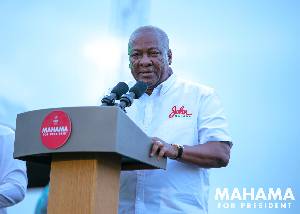“Don’t Use Accountability as a Pretext to Persecute Political Opponents†– Titi-Ofei Urges Mahama
In a recent statement that has sparked considerable discussion in Ghana's political landscape, Titi-Ofei, a prominent political figure, has advised former President John Mahama to refrain from utilizing accountability as a means to target political adversaries. This call for caution comes in the wake of increasing tensions within the Ghanaian political arena, where accusations of corruption and mismanagement are frequently exchanged between parties. Titi-Ofei's remarks highlight the need for genuine accountability that serves the public interest rather than a tool for political vendettas.
Titi-Ofei's concerns are rooted in the belief that accountability should be a cornerstone of governance, aimed at fostering transparency and integrity in public office. However, he cautioned that if accountability is wielded as a weapon against political opponents, it undermines the very principles it is meant to uphold. “Accountability should not morph into a guise for persecution,†he stated, urging Mahama and other political leaders to prioritize the welfare of the nation over personal ambitions. This sentiment resonates with many Ghanaians who are increasingly wary of the politicization of corruption allegations, which can lead to a toxic political environment and further polarization among the populace.
Furthermore, Titi-Ofei emphasized the importance of focusing on constructive dialogue and collaboration among political parties to address the pressing issues facing the country. With challenges such as economic instability, unemployment, and inadequate infrastructure, he argued that the political elite should work together to develop solutions rather than engaging in divisive tactics. “Instead of pointing fingers, let’s join hands to build a better Ghana,†he urged, advocating for a shift in focus from blame to cooperative governance. This approach not only promotes unity but also ensures that the interests of the citizenry remain at the forefront of political discourse.
The call for responsible leadership comes at a crucial time in Ghana’s political history, as the nation prepares for upcoming elections. The potential for accountability to be misused for political gain is particularly high in an election year, when parties are eager to discredit their opponents. Titi-Ofei's message serves as a reminder to all political actors that the true aim of accountability should be to foster a culture of good governance, where leaders are held to high ethical standards while also ensuring that political rivalries do not compromise the integrity of democratic processes.
In conclusion, Titi-Ofei's admonition to John Mahama underscores a critical issue in Ghanaian politics: the delicate balance between accountability and political rivalry. As the country navigates the complexities of governance and electoral politics, it is essential for leaders to prioritize the common good over personal agendas. By fostering a culture of genuine accountability that transcends political divides, Ghana can move towards a more transparent and effective governance model, ultimately benefiting all citizens.




No comments yet
Be the first to share your thoughts!